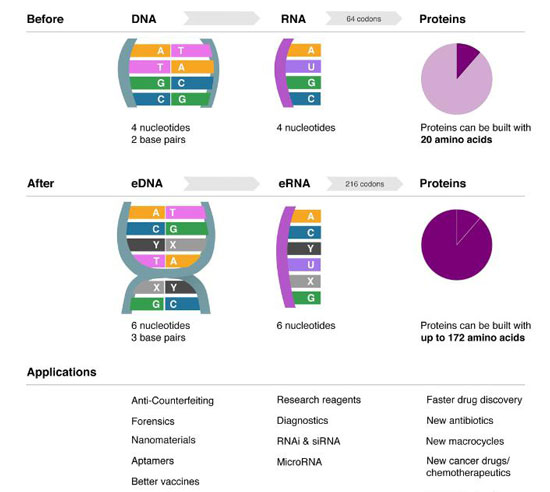| May 08, 2014 |
First example of in vivo replication of a synthetic DNA base pair published
|
|
(Nanowerk News) Synthorx Inc. announced today the official launch of the company, which will be focused on using synthetic biology to improve the discovery and development of new medicines, diagnostics and vaccines. In addition, research was published in Nature ("A semi-synthetic organism with an expanded genetic alphabet") by Floyd Romesberg, Ph.D., Synthorx's co-founder and associate professor of The Scripps Research Institute, describing the first example of the in vivo replication of a synthetic DNA base pair. The company has the exclusive rights to this synthetic biology technology from The Scripps Research Institute. Synthorx has received an undisclosed investment from Avalon Ventures and Correlation Ventures.
|
 |
| Expanding the genetic alphabet. By adding a synthetic base pair – two new synthetic nucleotides – to DNA, the Romesberg lab has increased the number of possible amino acids a cell can use to construct proteins, opening up new possibilities for DNA and RNA and for the production of proteins containing new kinds of amino acids. (Image: Synthorx)
|
|
Dr. Romesberg said, "For the past 14 years, we have been creating and optimizing synthetic DNA bases in my lab. Today we have shown the first example of a synthetic base pair undergoing DNA replication in a single-cell organism. The ability to incorporate and replicate a synthetic DNA base pair in vivo means that we have, for the first time, expanded the genetic alphabet to increase the amount of information that can be stored in DNA."
|
|
This is the first reported example of a semi-synthetic organism that is able to stably maintain and replicate a synthetic base pair in its DNA. The 'genetic alphabet' of DNA constitutes two base pairs (A–T and G-–C). Dr. Romesberg and his team have crafted another base pair d5SICSTP and dNaMTP (abbreviated X and Y). The incorporation of X and Y into DNA expands the genetic alphabet, allowing for the increased storage of information to improve the discovery and development of new drugs, diagnostics and vaccines as well as creating innovative products, including research reagents, aptamers and nanomaterials.
|
|
Mr. Court R. Turner, venture partner at Avalon Ventures and president of Synthorx said, "The limited combinations of the DNA bases, A, T, G and C, have restricted the types of new proteins, RNA and DNA that we could make. Adding X and Y to the genetic alphabet, we now have an expanded vocabulary to generate a variety of new inputs and materials for drug discovery, improved vaccines and improvements to nanotechnologies, such as microprocessing. We have already begun to further develop Dr. Romesberg's breakthrough technology at Synthorx and will work with partners to synthesize innovative solutions for numerous medical and technological applications."
|
|
About Synthorx
|
|
Synthorx is a biotechnology company using synthetic biology to synthesize solutions for the discovery and development of novel therapeutics, diagnostics and vaccines. With the revolutionary advancement of synthetic nucleotides that can be maintained and replicated by a single-cell organism, Synthorx is exploring the natural and evolution-directed technologies to improve drug discovery. Using synthetic nucleotides to expand the genetic alphabet, Synthorx is developing novel proteins, RNA and DNA for medical applications. The company was founded by Avalon Ventures based on important discoveries in Dr. Floyd Romesberg's lab at The Scripps Research Institute in La Jolla, CA.
|

